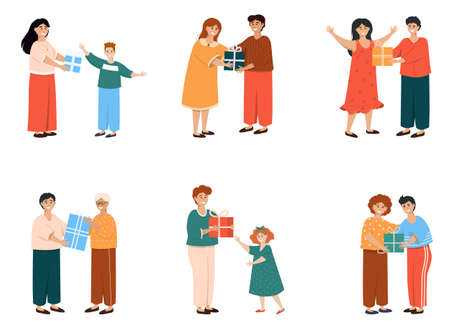1. Understanding Generational Differences in America
When exploring Bazi compatibility in multicultural families, it’s important to first understand how different generations in America see the world. Each generation—Baby Boomers, Gen X, Millennials, and Gen Z—grew up with unique experiences that shape their values, ways of communicating, and expectations about family life. These differences can impact family dynamics, especially in households blending Eastern and Western traditions.
Core Values Across Generations
| Generation | Typical Birth Years | Core Values |
|---|---|---|
| Baby Boomers | 1946-1964 | Hard work, loyalty, stability, respect for authority |
| Gen X | 1965-1980 | Independence, flexibility, pragmatism, work-life balance |
| Millennials | 1981-1996 | Diversity, collaboration, purpose-driven work, openness to change |
| Gen Z | 1997-2012 | Inclusivity, individuality, digital connectedness, social awareness |
Communication Styles by Generation
The way each generation communicates can lead to misunderstandings or stronger bonds. Baby Boomers often prefer face-to-face conversations and formal communication. Gen X is comfortable with both direct communication and digital methods like email. Millennials value feedback and collaboration; they tend to use texting and social media for daily interactions. Gen Z prefers short-form digital messaging and values authenticity in conversation.
Family Expectations: Tradition vs. Change
Family roles and expectations also differ. Baby Boomers often believe in traditional family structures and clear roles within the household. Gen X tends to support shared responsibilities between partners and encourages children to be independent early on. Millennials are more likely to challenge old norms—they favor equal partnerships and actively involve children in family decisions. Gen Z expects inclusivity and open-mindedness from their families; they are more likely to question established norms.
Navigating Multicultural Family Dynamics
For multicultural families blending Bazi compatibility with American generational perspectives, recognizing these differences is key. Awareness of each generation’s unique mindset can help create understanding and harmony at home while honoring both Eastern wisdom and American cultural realities.
2. Introduction to Bazi Compatibility in a Multicultural Setting
Understanding relationships within multicultural American families often involves navigating different traditions, beliefs, and values across generations. One unique approach that can offer insights is the Bazi system, also known as the Four Pillars of Destiny. While Bazi has its roots in Chinese culture, its principles can be applied thoughtfully and respectfully to help families from diverse backgrounds better understand each other.
What Is Bazi?
Bazi is an ancient Chinese system used to analyze a persons character, relationships, and life path based on their birth date and time. Each person’s Bazi chart is made up of four pillars: Year, Month, Day, and Hour. Each pillar contains two elements—a Heavenly Stem and an Earthly Branch—which together reveal information about personality traits and how people interact with others.
The Four Pillars at a Glance
| Pillar | Represents | Influence on Relationships |
|---|---|---|
| Year | Family Background & Early Environment | Relates to ancestry and family traditions |
| Month | Parents & Upbringing | Affects core values and social behavior |
| Day | Self & Spouse/Partner | Central to personal identity and intimate connections |
| Hour | Children & Aspirations | Reflects goals, legacy, and communication style with the next generation |
Bazi Compatibility in Modern American Families
Bazi compatibility looks at how the elements in one person’s chart interact with those in another’s. In a multicultural American context, this means considering not just traditional views but also the diversity of values present within the family. For example, while older generations may value harmony according to traditional Bazi interpretations, younger generations might prioritize individuality or open communication—sometimes leading to misunderstandings.
Sensitivity to Diverse Backgrounds
When applying Bazi in multicultural settings, it’s important to use it as a tool for understanding rather than judgment. Here are some ways Bazi can foster connection:
- Cultural Respect: Approach Bazi as one perspective among many, integrating it with each family member’s unique background.
- Open Dialogue: Use insights from Bazi charts as conversation starters about differences in personality and expectations.
- Finding Common Ground: Focus on strengths revealed by the charts to build mutual respect across generations.
An Example Scenario
If a first-generation immigrant parent sees value in stability (as reflected by their Earth element), but their American-born child seeks adventure (indicated by more Fire or Wood elements), Bazi can help both sides appreciate these differences without conflict. Rather than labeling behaviors as “right” or “wrong,” families can work together to balance tradition with new perspectives.

3. Bridging Cultural and Generational Gaps with Bazi
Understanding Different Perspectives in Multicultural Families
In American families, especially those with multicultural backgrounds, there can be big differences in how each generation views tradition and modern life. Parents or grandparents from East Asian cultures may value Bazi (the Four Pillars of Destiny) as an important guide for relationships and family decisions. Meanwhile, younger generations raised in the U.S. might see things differently, focusing more on personal freedom, equality, or open communication.
Practical Ways to Blend Bazi Insights with American Family Values
You don’t have to choose between tradition and modern life. Here are some practical ways to use Bazi compatibility alongside American family dynamics:
| Traditional Bazi Approach | Modern American Family Value | How to Combine Both |
|---|---|---|
| Consulting Bazi for marriage or partner compatibility | Emphasizing individual choice and love-based partnerships | Use Bazi as a discussion tool—not a rule—to talk about strengths and potential challenges, while respecting each person’s final choice |
| Looking at Bazi for children’s education or career guidance | Supporting children’s unique talents and interests | Let Bazi offer suggestions but encourage kids to pursue what truly excites them; see it as another way to understand their personality |
| Elders giving advice based on Bazi traditions | Young people valuing independence and self-expression | Create open conversations where elders share wisdom without pressure, allowing young family members to ask questions and make their own decisions |
Tips for Respectful Conversations Across Generations
- Acknowledge Differences: Start by recognizing that everyone comes from a different background—there’s no right or wrong way.
- Share Stories: Ask older relatives why certain traditions matter to them. Share your own experiences growing up in the U.S.
- Focus on Shared Goals: Remember, everyone wants happiness, harmony, and success for the family.
- Find Compromises: Maybe use Bazi for special occasions (like weddings), but leave day-to-day choices up to each person.
- Stay Open-Minded: Be curious about how combining both approaches could bring out the best in your family.
Bazi Compatibility: A Tool, Not a Rulebook
Bazi can be a helpful way to understand personalities and relationships in multicultural families. But it works best when used as a supportive tool, not a strict rulebook. By blending traditional insights with respect for modern American values—like openness and individuality—you can help create a family environment where everyone feels respected and understood.
4. Common Challenges Multicultural Families Face
Understanding Generational Differences in Multicultural Settings
Multicultural families, especially those in the U.S., often face unique challenges due to differences in culture, language, and family traditions. These differences are even more pronounced when multiple generations live together or interact frequently. Let’s look at some real-life scenarios where generational conflicts and misunderstandings can arise.
Scenario Examples: Where Conflicts Often Happen
| Scenario | Older Generation (Parents/Grandparents) | Younger Generation (Children/Teens) |
|---|---|---|
| Communication Styles | Prefer direct authority and traditional values; may speak native language at home. | Lean towards open discussions; prefer English or mixing languages. |
| Dating & Marriage Expectations | Value arranged marriages or choosing partners based on family background/Bazi compatibility. | Believe in dating for love; may not consider Bazi matching important. |
| Career Choices | Encourage stable professions like medicine, law, or engineering. | Interested in creative fields or less traditional careers. |
| Celebrating Holidays | Follow cultural traditions strictly (e.g., Lunar New Year rituals). | Might blend American holidays with family traditions; less formal about rituals. |
| Bazi & Cultural Beliefs | Treat Bazi as an essential guide for life decisions and relationships. | Might see Bazi as interesting but not crucial; rely more on personal feelings. |
Real-Life Example: Blended Family Dynamics
Sophia is a second-generation Chinese American who married John, an Irish American. Sophia’s parents value Bazi compatibility and were hesitant about the marriage since John’s birth details didn’t “match” Sophia’s according to traditional readings. Meanwhile, John’s parents were confused by the emphasis on astrology and just wanted their son to be happy. This led to tension during wedding planning, with both sides struggling to understand each other’s priorities and beliefs.
Cultural Misunderstandings in Everyday Life
Cultural misunderstandings aren’t limited to big life events—they can pop up daily. For instance, grandparents might expect grandchildren to greet elders in a traditional way, while the younger generation sees a simple “hi” as enough. Or, parents might want children to eat traditional foods, while kids prefer pizza or burgers. These small differences can add up and cause frustration if not addressed openly.
Navigating Different Values and Finding Balance
The key challenge for many multicultural families in the U.S. is finding a balance between respecting cultural heritage (including practices like Bazi) and adapting to the local culture their children are growing up in. It takes patience, open conversations, and sometimes compromise from all family members to create harmony at home.
5. Advice for Harmonizing Family Relationships
Building Bridges Across Generations and Cultures
Living in a multicultural family means blending different backgrounds, beliefs, and traditions. Generational differences can make things even more interesting—and sometimes challenging. By using Bazi compatibility as a helpful guide, not a strict rule, families can find new ways to understand each other and grow closer. Here are some practical tips to help multicultural families create strong, loving relationships.
Actionable Tips for Multicultural Families
| Tip | How to Apply It |
|---|---|
| Open Communication | Create regular family check-ins where everyone shares their feelings and thoughts without judgment. Use simple, clear language that works for all ages and backgrounds. |
| Celebrate Differences | Make it a point to learn about each others cultures and traditions—try new foods, celebrate holidays from both sides, and share stories from your past. |
| Use Bazi as a Conversation Starter | Instead of seeing Bazi compatibility as a strict rule, use it to spark conversations about personality traits and preferences. For example, compare Bazi charts in a fun way and discuss how they match or differ. |
| Practice Flexibility | Remember that every generation and culture has its own way of doing things. Stay open-minded when faced with different habits or opinions—compromise when possible. |
| Set Family Goals Together | Create shared goals or traditions as a family unit—like weekly game nights or volunteering together—to strengthen your bond beyond cultural boundaries. |
The Role of Bazi Compatibility: A Helpful Tool, Not a Rulebook
Bazi charts can offer insights into personal strengths, challenges, and communication styles. In an American context, think of them like personality tests such as Myers-Briggs or Enneagram—they’re useful for self-awareness but shouldn’t dictate life decisions. Encourage family members to appreciate what Bazi suggests while keeping space for individual choice and growth.
Quick Comparison Table: Bazi vs. Western Personality Tools
| Bazi Compatibility | Western Personality Tools (e.g., Myers-Briggs) |
|---|---|
| Focuses on birth data and Chinese metaphysics; highlights elemental balance and destiny paths. | Based on questionnaires; focuses on traits, behaviors, and preferences. |
| Cultural heritage: rooted in Eastern philosophies. | Cultural heritage: rooted in Western psychology. |
| Best used as guidance—not absolute truth. | Best used for self-understanding—not labeling others strictly. |
Final Thought for Families: Stay Curious and Supportive!
No matter your background or generation, curiosity and support go a long way in building happy families. Embrace your differences, use tools like Bazi wisely, and keep learning about each other—your unique mix is what makes your family special!
6. Real-Life Stories and Lessons Learned
Learning from Multicultural American Families
Generational differences can be tricky for any family, but when you add cultural diversity and Bazi (Chinese Four Pillars of Destiny) into the mix, things can get even more interesting. Here are some real-life stories—shared anonymously—to show how multicultural American families have used both open communication and Bazi insights to bridge generational gaps.
Case Example 1: Blending East and West in Parenting Styles
The Family: A Chinese-American mother and her African-American husband with two teenage children.
The Challenge: The mother’s parents believed in traditional values and often consulted Bazi to make important decisions, while the father valued individual freedom and modern parenting approaches.
What Worked:
| Challenge | Action Taken | Lesson Learned |
|---|---|---|
| Disagreements on children’s education paths | Bazi readings were discussed openly, with both sides explaining their perspectives. | Mutual respect grew, and they created a blended approach to support both heritage and independence. |
| Cultural holiday traditions | The family tried alternating between traditions and involving kids in planning. | Children felt included; grandparents saw their traditions honored alongside new ones. |
Case Example 2: Cross-Generational Communication Styles
The Family: An American-born Filipino daughter-in-law living with her Chinese in-laws.
The Challenge: Language barriers and different ways of expressing emotions caused misunderstandings, especially around Bazi-based advice.
What Worked:
- The daughter-in-law learned simple phrases in Mandarin to show respect.
- Bazi readings became family events where everyone could ask questions.
- This fostered patience, empathy, and better understanding across generations.
Case Example 3: Navigating Career Choices
The Family: A Vietnamese-American son debating between a creative career and his parents’ wish for a more “stable” profession (as guided by Bazi).
- A trusted family friend acted as a mediator, helping translate Bazi guidance into practical advice.
- The son shared his passions openly, while parents explained their hopes based on tradition.
- Together, they agreed on a plan that balanced personal ambition with family expectations, using Bazi as one of several guiding tools.
Key Takeaways for Multicultural Families
The experiences above show that successful navigation of generational and cultural differences involves open-mindedness, willingness to learn from each other, and seeing Bazi as a bridge rather than a barrier. Every family is unique—these examples offer hope that blending tradition with modern values is possible with patience and honest conversations.

